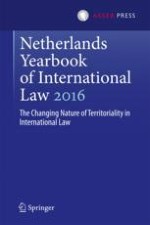2017 | OriginalPaper | Buchkapitel
9. Extraterritorial Obligations and the Obligation to Protect
verfasst von : Sigrun Skogly
Erschienen in: Netherlands Yearbook of International Law 2016
Verlag: T.M.C. Asser Press
Aktivieren Sie unsere intelligente Suche, um passende Fachinhalte oder Patente zu finden.
Wählen Sie Textabschnitte aus um mit Künstlicher Intelligenz passenden Patente zu finden. powered by
Markieren Sie Textabschnitte, um KI-gestützt weitere passende Inhalte zu finden. powered by
